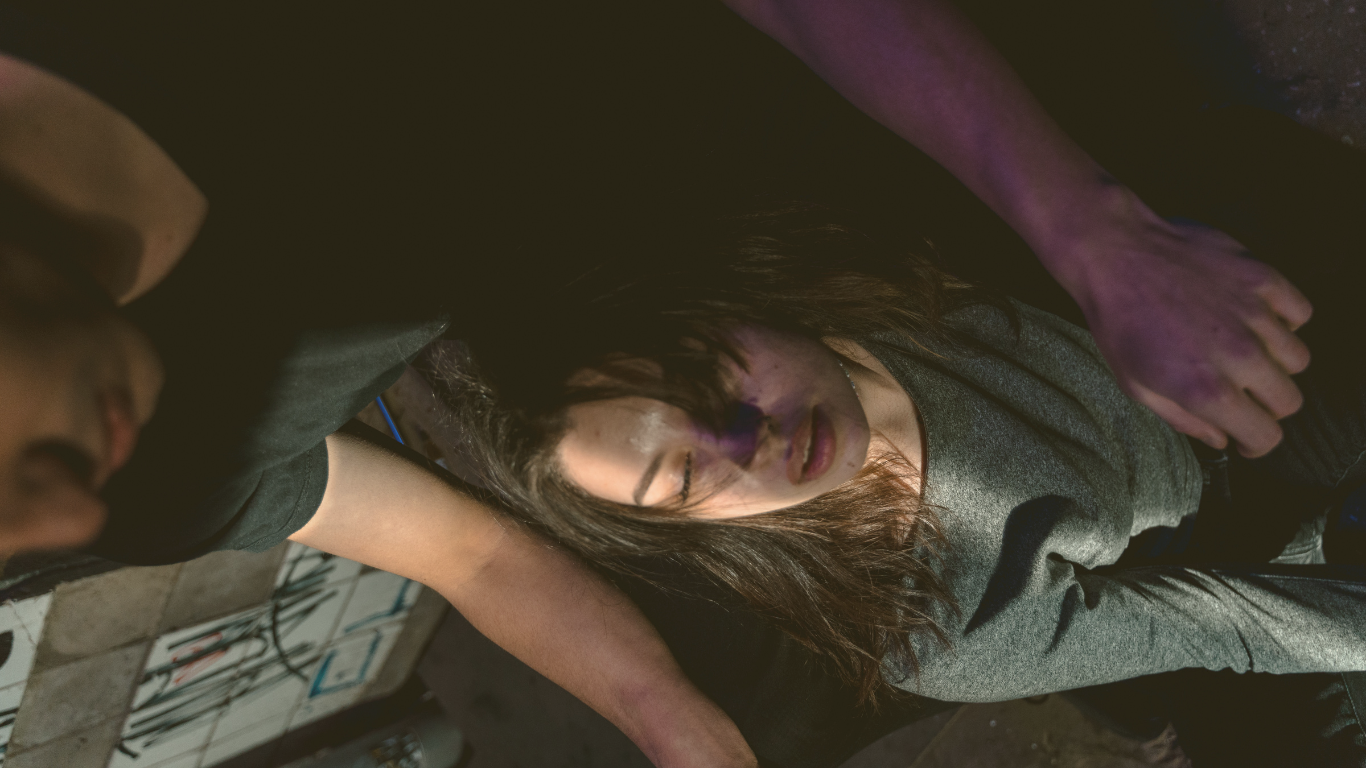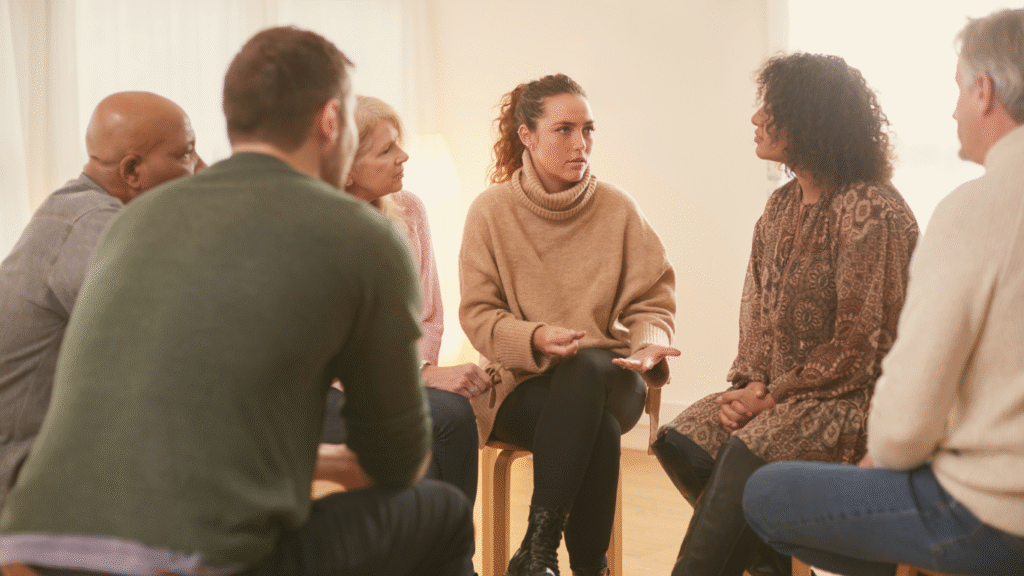Cocaine Addiction Treatment in Atlanta, GA

In Atlanta, individuals seeking recovery from cocaine addiction can find support through various treatment avenues. MARR Treatment Centers’ cocaine addiction treatment in Atlanta, GA, has a goal of assisting people in overcoming cocaine dependence by utilizing proven therapeutic methods and comprehensive support systems.
Our specialized programs tackle both the body’s physical reliance on cocaine and the mental and emotional roots of the addiction. Recovery typically begins with a detox phase, providing a safe environment to navigate withdrawal and transitions into in-depth therapy and counseling sessions designed to identify and address the core issues driving the addiction.
We recognize that addiction affects different populations uniquely, offering specialized programs that consider cultural, social, and personal factors.
Recovery success rates improve when people receive comprehensive care that includes medical treatment, behavioral therapy, and ongoing support groups.
Our Leading Cocaine Addiction Treatment Center
We understand that addiction affects not just the individual but the entire family. That’s why, alongside our substance use disorder treatments, we’re dedicated to providing education, support, and resources for families navigating their recovery journey.
We recognize that the stigma surrounding addiction often prevents individuals and their families from seeking help. Because addiction is a “family disease,” family involvement is crucial for successful recovery.
Our team offers education, resources, counseling, and support groups to empower families. We equip them with the knowledge and tools to support themselves and build healthier relationships with their loved ones struggling with addiction.
Our alumni share their experiences of how family dynamics influenced their addiction:
My family’s empty threats reinforced that my actions wouldn’t have real consequences.
My family’s cover-ups taught me I could avoid responsibility for my actions.
Our Treatment Programs
Here’s a breakdown of Partial Hospitalization Programs (PHP), Intensive Outpatient Programs (IOP), Traditional Outpatient Programs, and Therapeutic Community programs, along with their key features and differences.
Partial Hospitalization Program (PHP)
- Intensity: This is one of the most intensive outpatient options.
- Structure: Clients typically attend treatment for a significant portion of the day, several days a week (e.g., 5-7 days a week, 6-8 hours a day).
- Services: PHP offers a comprehensive range of services, similar to inpatient care, including:
- Individual and group therapy
- Medical monitoring (if needed)
- Medication management
- Psychiatric services
- Case management
- Ideal for: Individuals who need high support and structure but don’t require 24/7 inpatient care. Suitable for those transitioning from inpatient rehab or who need more support than traditional outpatient programs can provide. It is also ideal for those with co-occurring mental health disorders.
- Living situation: Clients live at home while attending PHP.
Intensive Outpatient Program (IOP)
- Intensity: Moderate level of intensity, less than PHP but more than traditional outpatient.
- Structure: Clients attend treatment several days a week for a few hours each day (e.g., 3-5 days a week, 2-4 hours a day).
- Services: IOP typically includes:
- Group therapy (the primary focus)
- Individual counseling
- Educational sessions
- Relapse prevention strategies
- Drug/alcohol testing
- Ideal for: Individuals who need more support than traditional outpatient therapy offers but can maintain some independence. It’s a good step down from PHP or inpatient care. It’s suitable for those with stable living situations and a moderate level of motivation for recovery.
- Living situation: Clients live at home.
Traditional Outpatient Program
- Intensity: Least intensive level of care.
- Structure: Clients attend therapy or counseling sessions less frequently (e.g., once a week, bi-weekly).
- Services: Individual therapy, group therapy, or a combination of both. This may include medication management.
- Ideal for: Individuals with a strong support system, a high level of motivation, and less severe addiction issues. It is also suitable for ongoing maintenance and relapse prevention after completing a more intensive program.
- Living situation: Clients live at home and maintain their daily routines.
Therapeutic Community (TC)
- Intensity: TC involves a more immersive and structured environment than standard outpatient programs.
- Structure: The TC model emphasizes the community as a primary change agent. Clients participate in all aspects of the community’s functioning.
- Services:
- Group therapy is central, often involving confrontation and peer support.
- Work assignments and community responsibilities are integrated into the treatment process.
- Focus on personal responsibility, accountability, and social learning.
- May include individual counseling, educational groups, and recreational activities.
- Ideal for: Individuals with chronic substance use disorders, a history of treatment failures, or significant psychosocial issues. TCs can be effective for those who need a highly structured and supportive environment to develop coping skills and change their behavior.
- Living situation: TC clients live in our housing while others participate during the day and return home at night.

Our Treatment Services
Our treatment services include psychodrama therapy, brainspotting, trauma therapy, and holistic therapy, all of which emphasize a family-focused approach.
- Psychodrama Therapy is an action-oriented therapy where individuals explore their thoughts, feelings, and experiences through dramatic action and role-playing.
- Brainspotting is a focused treatment method that works by identifying, processing, and releasing trauma stored in the brain. It’s based on the idea that “where you look affects how you feel.”
- Trauma therapy encompasses various therapeutic approaches specifically designed to address the impact of traumatic experiences. Common types include:
- Cognitive Behavioral Therapy (CBT) helps individuals identify and change negative thought patterns and behaviors related to trauma.
- Eye Movement Desensitization and Reprocessing (EMDR) uses bilateral stimulation (e.g., eye movements) to help process and integrate traumatic memories.
- Prolonged Exposure Therapy (PE) involves gradually exposing the individual to trauma-related memories, feelings, and situations to reduce anxiety and avoidance.
- Cognitive Behavioral Therapy (CBT) helps individuals identify and change negative thought patterns and behaviors related to trauma.
- Holistic therapy addresses the “whole person” – mind, body, and spirit – rather than focusing solely on the addiction itself.
Understanding Cocaine Addiction
Cocaine changes brain chemistry and creates powerful physical and psychological effects. These changes lead to distinct warning signs that help identify addiction early.
Cocaine’s Effects on the Brain
Cocaine directly affects the brain’s reward system by blocking the reuptake of dopamine and other neurotransmitters. This causes dopamine to build up between nerve cells, creating intense pleasure and euphoria.
With repeated use, the brain adapts and becomes less sensitive to cocaine’s effects. This leads to tolerance, where users need larger amounts to feel the same high.
The brain’s reward circuits become rewired, leading to intense cocaine cravings and compulsive drug-seeking behavior.
Signs and Symptoms of Cocaine Addiction
Physical Signs:
- Dilated pupils
- Increased heart rate and blood pressure
- Decreased appetite
- Disturbed sleep patterns
- Nosebleeds (from snorting)
Behavioral Changes:
- Sudden mood swings
- Increased energy followed by crashes
- Social withdrawal
- Financial problems
- Risk-taking behavior
The person may spend large amounts of time obtaining and using cocaine while neglecting work, family, and other responsibilities.
Health Risks and Co-Occurring Disorders
Cocaine addiction and mental health disorders create dangerous combinations that require specialized medical care. The physical toll on the body, paired with mental health challenges, demands comprehensive treatment approaches.
Mental and Physical Health Complications
Cocaine severely impacts the cardiovascular system. Each use increases the risk of heart attack and stroke. Regular cocaine use can trigger seizures and permanent brain damage.
Drug use often occurs alongside mental health concerns, making treatment more complex. Common co-occurring conditions include:
- Depression
- Anxiety
- Obsessive-compulsive disorder
- Panic disorders
Physical health risks include:
- High blood pressure
- Heart rhythm problems
- Liver damage and hepatitis
- Respiratory issues
Treatment of Co-Occurring Mental Health Conditions
MARR Treatment Centers’ programs address both addiction and mental health to be effective. Our integrated treatment plans combine medication, therapy, and support groups.
Medical supervision helps manage withdrawal symptoms and mental health medications safely. Regular mental health screenings track progress and adjust treatment as needed.
Individuals with co-occurring disorders need specialized care. We use evidence-based therapies like cognitive behavioral therapy and trauma-informed care.
Support groups provide community connections and coping skills. Family therapy helps rebuild relationships damaged by addiction.
Frequently Asked Questions
Getting proper treatment for cocaine addiction requires understanding the available options, therapy approaches, detox protocols, and support systems. Our medical professionals and addiction specialists work together to create individualized recovery plans.
What options are available for cocaine addiction treatment in Atlanta?
Atlanta treatment centers offer both inpatient and outpatient programs for cocaine addiction. Inpatient facilities provide 24/7 medical supervision and structured therapy.
Treatment centers combine medical care, counseling, and behavioral therapy. Some facilities also offer medication-assisted treatment to help manage withdrawal symptoms.
Programs typically run for 30-90 days, depending on individual needs and addiction severity.
How effective is psychotherapy in managing cocaine dependency?
Cognitive Behavioral Therapy (CBT) helps identify triggers and develop coping strategies. Group therapy sessions allow patients to share experiences and learn from others.
Family therapy helps repair relationships and build support networks. Studies show therapy combined with other treatments leads to better outcomes.
What are the steps involved in the detoxification process for cocaine addiction?
Medical staff first conduct a thorough health assessment. Vital signs are monitored constantly during the initial 48-72 hours of detox.
Medications may be prescribed to manage withdrawal symptoms like anxiety and depression. The detox process typically takes 5-7 days under medical supervision.
Are there any support groups for individuals recovering from cocaine addiction in Atlanta?
Narcotics Anonymous holds daily meetings throughout Atlanta. SMART Recovery offers science-based addiction support meetings.
Local churches and community centers host various recovery support groups. Many groups are free to attend and welcome newcomers.
Can lifestyle changes impact the recovery process from cocaine addiction?
Regular exercise helps reduce cravings and improve mood. A balanced diet supports physical healing during recovery.
Establishing healthy sleep patterns aids mental recovery. Stress management techniques like meditation strengthen recovery success.
How do we recognize signs that someone may need treatment for cocaine abuse?
Physical signs include dilated pupils, changes in sleep patterns, and sudden weight loss. Behavioral changes may include mood swings, isolation, and neglecting responsibilities.
Drug use symptoms can include financial problems and relationship difficulties. Seeking treatment early increases the chances of successful recovery.
Are you or a loved one struggling with substance abuse and seeking cocaine rehab in Georgia? At our recovery center, we understand the complexities of cocaine addiction treatment and offer comprehensive treatment options tailored to your individual needs.
Our goal is to guide you toward long-term recovery and lasting wellness through evidence-based therapies and dedicated support.
As a leading treatment facility, we provide a full spectrum of care, addressing both the physical and psychological aspects of addiction.
Take the first step towards a healthier future – contact us today at 678-884-4080 to explore your substance abuse treatment options and begin your journey to recovery in Atlanta, Georgia.
